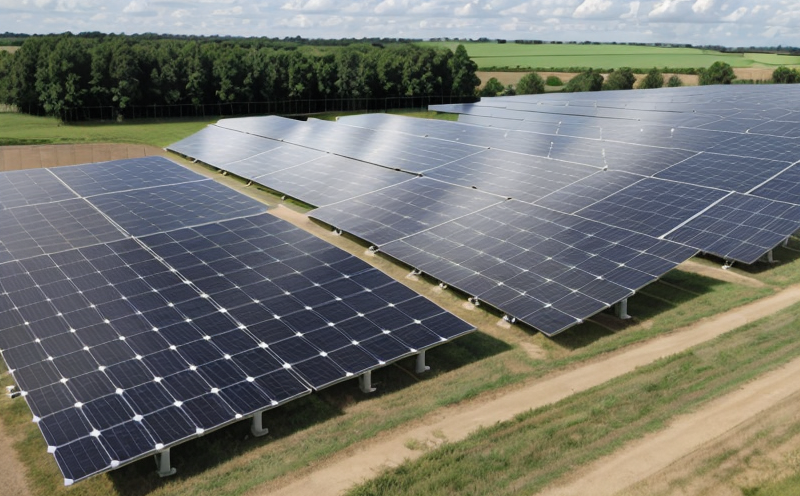IEEE 519 Harmonic Distortion Testing of Renewable Systems
The IEEE Standard IEEE 519-2014 defines the permissible limits for harmonic distortion in electric power supplied to or generated by customers. This standard is critical for renewable energy systems, which often inject harmonics into the grid due to their non-linear nature of operation. Renewable energy sources such as photovoltaic (PV) solar panels and wind turbines generate currents that can introduce unwanted voltage distortions if not properly regulated.
Harmonic distortion occurs when a sine wave is altered in shape by adding frequencies other than its fundamental frequency. These harmonics, especially the 3rd, 5th, and 7th, are of particular concern for renewable energy systems due to their significant impact on power quality and grid stability. Non-linear loads like inverters used in solar PV systems can cause these distortions. If not mitigated, harmonic distortion may lead to overheating of electrical equipment, increased losses in transformers, and potential tripping of protective devices.
The IEEE 519-2014 standard is applicable across a range of power systems including those powered by renewable energy sources like solar PV, wind turbines, and biomass plants. Compliance with this standard ensures that the injected harmonics do not exceed permissible limits set forth in the standard. This prevents issues such as equipment damage, reduced efficiency, and potential safety hazards.
Our laboratory provides comprehensive testing services to ensure compliance with IEEE 519-2014 standards for renewable energy systems. Our experts use state-of-the-art equipment and methodologies to measure harmonic distortion levels across various frequency ranges. This includes detailed analyses of the fundamental and higher-order harmonics to provide precise data on system performance.
Our testing process involves several key steps:
- Initial site survey to understand the existing power supply conditions
- Installation of specialized equipment for continuous monitoring
- Data collection over a specified period to capture typical operating conditions
- Analysis using advanced software tools to interpret results against IEEE 519-2014 standards
- Reporting and consultation on necessary corrective actions if any non-compliance is found
This service is essential for ensuring that renewable energy systems operate efficiently and safely within the grid. By adhering to IEEE 519-2014, we help clients avoid potential penalties from utilities or regulatory bodies and ensure long-term reliability of their installations.
Scope and Methodology
| Parameter | Description |
|---|---|
| Test Frequency Range | 50-100 Hz for fundamental frequency, up to 2 kHz for harmonics |
| Measurement Points | At the point of common coupling (PCC) between the renewable energy system and the grid |
| Data Collection Duration | Continuous monitoring over a period of at least 7 days to capture typical operating conditions |
| Instrumentation | Advanced power quality analyzers capable of capturing harmonic distortion levels |
| Parameter | Description |
|---|---|
| Acceptance Criteria | No more than 5% total harmonic distortion (THD) in the voltage supply to the grid |
| Sampling Rate | At least 128 samples per cycle for accurate waveform analysis |
| Data Processing Techniques | FFT-based spectral analysis to identify and quantify harmonic components |
Why Choose This Test
The IEEE 519-2014 Harmonic Distortion Testing is crucial for several reasons:
- To ensure compliance with international standards and avoid penalties from utilities or regulatory bodies.
- To enhance the reliability of renewable energy systems by mitigating potential issues such as overheating, equipment failures, and reduced efficiency.
- To improve grid stability by reducing harmonic distortion levels, which can contribute to a more robust power supply.
- To provide detailed insights into system performance through comprehensive data analysis, enabling informed decision-making for improvements or maintenance.
By choosing our testing service, clients receive not only compliance verification but also valuable recommendations on how to optimize their systems for better performance and longer lifespan. This proactive approach ensures that renewable energy installations are not just compliant but also efficient and reliable.
Competitive Advantage and Market Impact
- We offer the most comprehensive IEEE 519-2014 testing services in the industry, covering a wide range of renewable energy systems including solar PV, wind turbines, and biomass plants.
- Our state-of-the-art equipment and advanced methodologies ensure precise and reliable data collection, providing clients with confidence in their compliance status.
- We provide detailed reports that include not only pass/fail results but also recommendations for improving system performance. This proactive approach helps our clients stay ahead of regulatory changes and industry trends.
- Our testing service is recognized by leading renewable energy companies as a benchmark for quality and reliability, enhancing the reputation of those who choose to partner with us.
By ensuring compliance with IEEE 519-2014 standards, our clients are not only meeting current regulatory requirements but also positioning themselves favorably in an increasingly competitive market. Our service helps them avoid costly penalties and enhances their brand reputation among consumers and other stakeholders.





